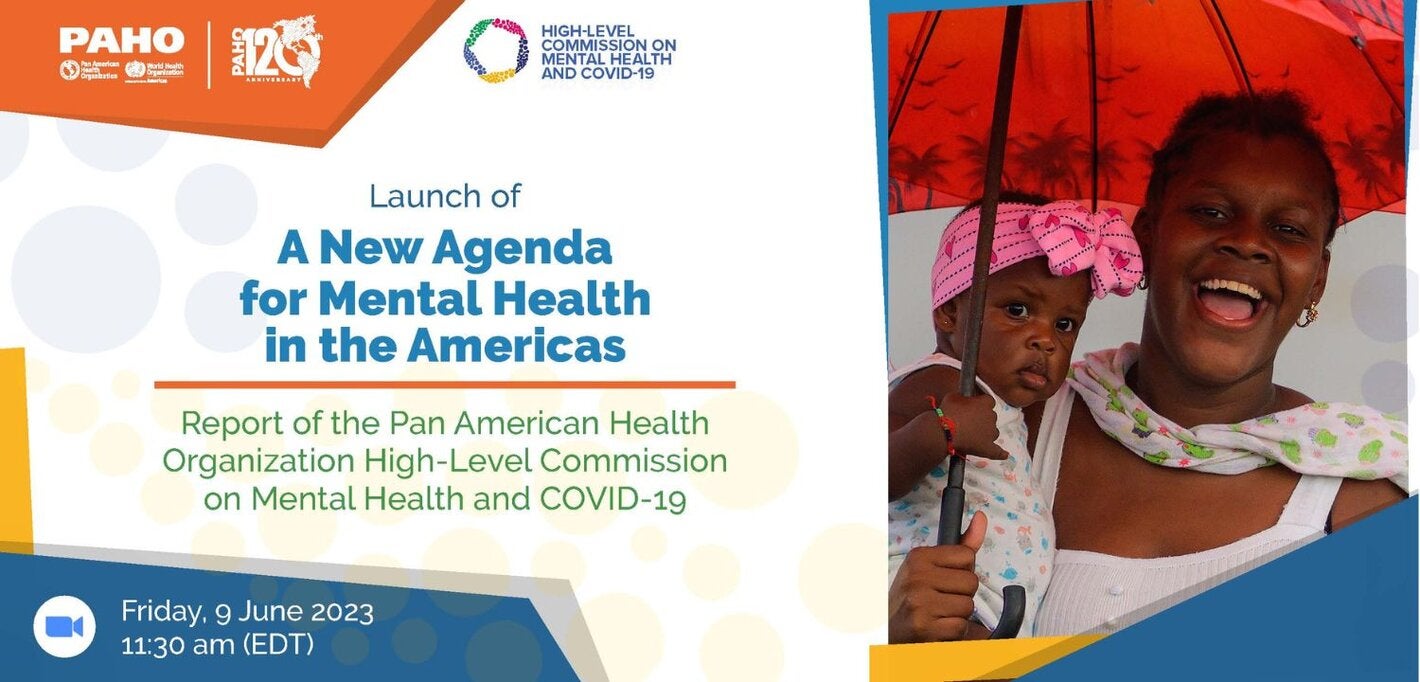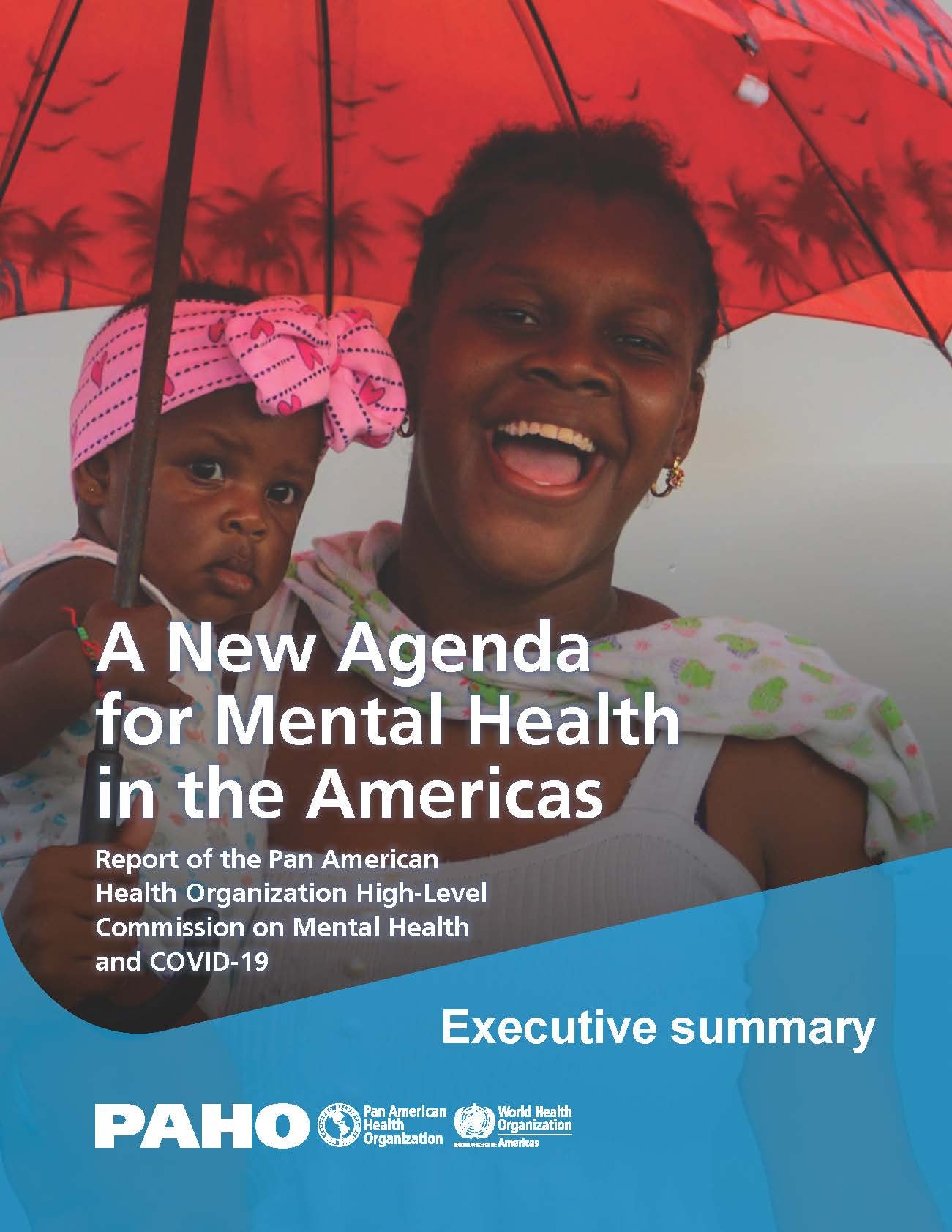
Join us on Friday, June 9, 2023, at the launch of the new report "A new agenda for mental health in the Americas", the result of the work carried out by the PAHO High Level Commission on Mental Health and COVID-19. The event will be broadcasted via Zoom starting at 11:30 am (Washington DC time) and will have simultaneous interpretation in Spanish, English, French and Portuguese.
The New Agenda for Mental Health in the Americas (NAMHA) is a package of priority mental health policy and strategy actions that are crafted for incorporation into countries’ post-pandemic recovery strategies. It explicitly builds on the underlying and cross-cutting principles of universal health coverage, human rights, equity and nondiscrimination, empowerment of people with mental health conditions and their families, and harnessing the benefits of multisectoral action, where different sectors and actors pool financial resources, knowledge, and skills.
How to participate
- DATE: Friday, 9 June, 2023
- TIME: 11:30 AM EDT [check below the local time in other cities]
- REGISTER: https://paho-org.zoom.us/webinar/register/WN_VeNN9B3TQaOr4RmSUEkvfQ
- After registering, you will receive a confirmation email containing information about joining the virtual session.
- LANGUAGES: The event will be in English, Spanish, Portuguese and French, with interpretation to all the languages.
Broadcast
About the event
The launch "A new agenda for mental health in the Americas " will be a hybrid event with the participation of high-level authorities and experts. The ten recommendations of the report will be presented and there will be also two panels: one discussing the key priorities for mental health, and a second one to present how to put these recommendations into practice at the national level.
Agenda
Moderator: Renato Oliveira e Souza, Chief, Mental Health and Substance Use Unit, PAHO
11:30-11:35: Welcome remarks Dr. Jarbas Barbosa da Silva Jr. - Director, Pan American Health Organization
11:35-11:45: Opening remarks (video) S.E. Gabriel Boric, President of Chile
11:45-11:50: Opening remarks Ambassador Nestor Mendez, Assistant Secretary General of the Organization of American States, Co-Chair of the PAHO High-Level Commission on Mental Health and COVID-19
11:50-11:55: Commission video
11:55-12:10: Presentation of the Report of the PAHO High-Level Commission on Mental Health and COVID-19 H.E. Epsy Campbell Barr, Former Vice President of Costa Rica, Chair of the PAHO High-Level Commission on Mental Health and COVID-19
12:10 - 12:35: Panel: A New Agenda for Mental Health: Key Priorities
Moderator: Ms. Dévora Kestel, Director, Department of Mental Health and Substance Use, World Health Organization
Panelists:
- Dr. Anselm Hennis, Director, Department of Noncommunicable Diseases and Mental Health, Pan American Health Organization
- Dr. Jaime Bayona Garcia, Senior Health Specialist, Health Nutrition & Population Global Engagement Unit, World Bank Group
- Dr. Pamela Collins, Director of the University of Washington Consortium for Global Mental Health, University of Washington, United States
- Dr. Katija Khan, President, Caribbean Alliance of National Psychological Associations, Trinidad and Tobago
- Ms. Paulina del Rio, President and Co-founder of Fundación José Ignacio, Chile
12:35 - 1:05: Putting the Recommendations into Practice at the National Level
- Dr. Frank Anthony, Minister of Health of Guyana
- Dr. Delia De Icaza, National Head of the Mental Health Section of the General Directorate of Public Health of Panama
1:05 - 1:15: Closing Remarks Dr. Renato Oliveira e Souza, Chief, Mental Health and Substance Use Unit, PAHO
Context
Prior to the pandemic, poor mental health, structural limitations and barriers for accessing quality mental health and wellness services, and lack of funding were already major and growing contributors to overall ill-health in the Region – with the Americas being the only World Health Organization (WHO) Region where suicide rates have been increasing. In 2020, median government funding for mental health as a proportion of total health spending was a mere 3%, with nearly half of these funds allocated to psychiatric hospitals, which can be associated with poorer treatment outcomes and human rights violations, in particular with reference to long-term psychiatric hospitalization. A historic lack of prioritization and investment in mental health has resulted in weak mental health systems and poor service coverage and quality. The care needs of most people in the Region living with mental health and substance use conditions have remained unmet, especially those living in conditions of vulnerability, including historically discriminated populations such as Indigenous and Afro-descendent communities.
The pandemic has sparked increased discourse on mental health, highlighting the extent of the crisis and putting systemic failings in mental health services under fresh scrutiny. Governments of the Region are under pressure to make sound policy choices to strengthen mental health within the broader agenda of post-pandemic recovery.
Recognizing that policymakers needed clear guidance on the immediate priorities, the Pan American Health Organization (PAHO) convened the High-Level Commission on Mental Health and COVID-19. NAHMA is the result of one year of work. It presents evidence-based approaches to address the crisis generated by the COVID-19 pandemic in the short term, while laying robust foundations for the longer term – in order to ensure optimal improvements in mental health care in the Region of the Americas.
Members of the commission
The Commission is composed of 17 diverse representatives of government, health organizations, academia, civil society, and people with lived experience from across the Region of the Americas, with the Chair being Her Excellency, Epsy Campbell Barr, former Vice President of Costa Rica, and Co-Chair, Ambassador Nestor Mendez, Assistant Secretary General of the Organization of American States.
- Chair: Epsy Campbell Barr, Former Vice President of Costa Rica.
- Co-Chair: Nestor Mendez, Assistant Secretary General, Organization of American States.
- Rubén Alvarado Muñoz, Full Professor, Department of Public Health, School of Medicine, Universidad de Valparaíso, Chile.
- Mary Bartram, Director, Mental Health and Substance Use, Mental Health Commission of Canada.
- Paul Bolton, Mental Health and Psychosocial Support Coordinator, United States Agency for International Development.
- Pamela Collins, Director of the University of Washington Consortium for Global Mental Health, University of Washington, United States.
- Paulina Del Rio, President and Co-Founder of Fundación José Ignacio, Chile.
- Carmen Montón Giménez, Permanent Observer of Spain to the Organization of American States.
- Shirley J. Holloway, President, Board of Directors, National Alliance on Mental Illness, United States.
- Katija Khan, President, Caribbean Alliance of National Psychological Associations, Trinidad and Tobago.
- María Elena Medina-Mora, Director of the Faculty of Psychology, National Autonomous University of Mexico.
- Ana Cristina Mendoza, Psychologist, Guatemala.
- Paulo Rossi Menezes, Professor of Preventative Medicine, University of São Paulo, Brazil.
- Alejandra Mora Mora, Executive Secretary of the Inter-American Commission of Women, Organization of American States.
- Shekhar Saxena, Professor of the Practice of Global Mental Health, Harvard T. H. Chan School of Public Health, United States.
- Juan Pablo Uribe, Global Director, Health, Nutrition & Population and the Global Financing Facility, World Bank Group.
- Sahar Vasquez, Co-Founder, Mind Health Connect, Belize.
Time correspondence
- 8:30 am. – Vancouver, Los Angeles.
- 9:30 am. – Guatemala, Ciudad de México, San Jose (CR), Tegucigalpa, San Salvador.
- 10:30 am. – Bogota, Panama, Kingston, Quito, Lima.
- 11:30 am. – Washington DC, Asunción, Caracas, Havana, La Paz, Santiago de Chile, Santo Domingo, Ottawa, Port-au-Prince, San Juan, Santo Domingo, Bridgetown, Nassau.
- 12:30 pm. – Buenos Aires, São Paulo, Montevideo, Brasilia, Paramaribo.
- 5:30 pm. – Geneva, Madrid.
For other cities, check the local time in the following link.
Report of the High Level Commission on Mental Health and COVID-19

